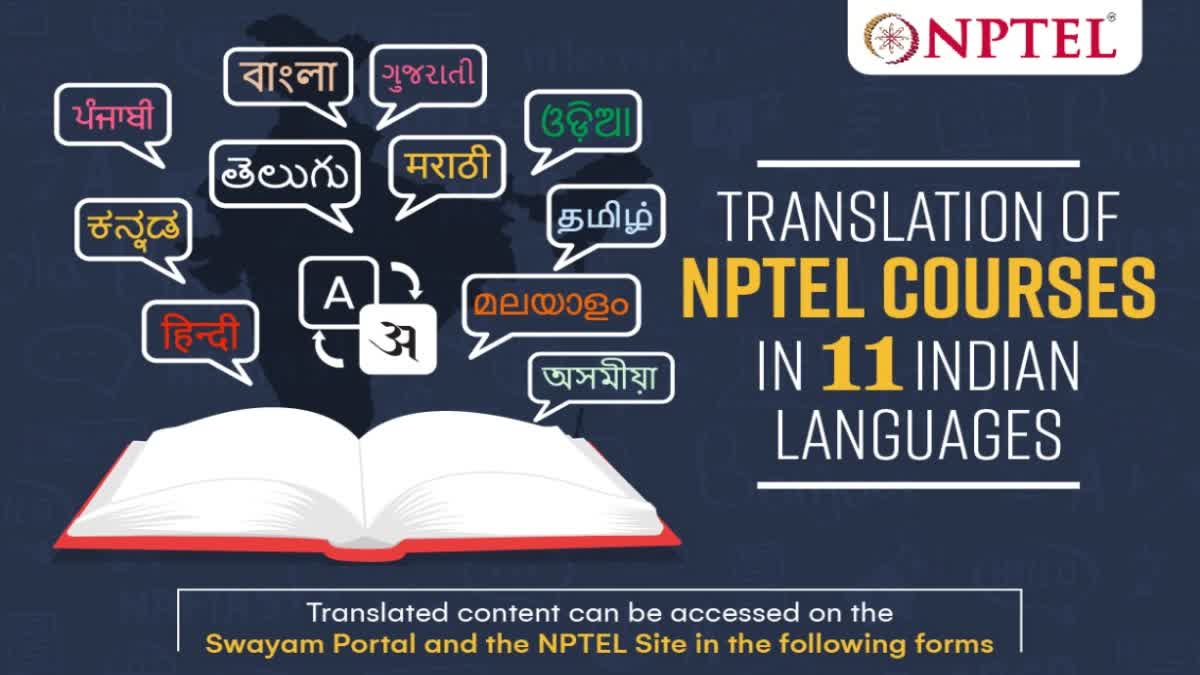Chennai: IIT Madras NPTEL has translated to Tamil Language as many as 174 technical courses including highly sought-after courses like ‘Programming, Data Structures, and Algorithms Using Python’. The focus is on translating courses across various disciplines with 682 translators and 51 Quality Control (QC) experts engaged for Tamil translation.
Additionally, a total of 159 Tamil language e-books have been published on the NPTEL website providing more resources for Tamil-speaking learners. Furthermore, audio embeds for 906 hours of video content in Tamil are available, with positive feedback received from learners regarding the accessibility and comprehension of translated materials.
NPTEL has translated its courses into 11 languages, including Assamese, Bengali, Gujarati, Hindi, Kannada, Malayalam, Marathi, Odia, Punjabi, Tamil and Telugu. The objective is to help learners who completed their schooling in regional languages and are transitioning to English for technical education.
Further information and access to NPTEL’s translated courses can be obtained from the following web page - https://nptel.ac.in/translation
Highlighting the initiative to translate technical content into vernacular languages, NPTEL Translation Coordinator Prof. Rajesh Kumar, Department of Humanities and Social Sciences, IIT Madras said, “Every language is a world in itself. Without translation, I would be confined to the borders of my own world. NPTEL strives to break this barrier.”
Further, Prof. Abhijit P Deshpande, also a NPTEL Translation Coordinator and a faculty, Department of Chemical Engineering, IIT Madras said, “NPTEL-IIT Madras is adopting innovative ways to make the translated content available to learners in India. They include the use of subtitles, video Text tracks, Transcripts, Books with slides and Audio tracks, among others. The key objective is to build capacity in India in high quality translation of science/engineering content.”
NPTEL (National Programme on Technology Enhanced Learning) is a joint venture of the IITs and IISc, funded by Ministry of Education (MoE), Government of India, and was launched in 2003.
NPTEL has significantly broadened its scope. While originally conceived to democratise access to quality education nationwide, NPTEL now offers a diverse catalogue of over 700 courses for certification every semester across 22 disciplines.
These translated materials undergo rigorous review by NPTEL Quality Control (QC) experts and are made available on the SWAMYAM and NPTEL websites in various formats, such as PDF transcripts, e-books, subtitles, scrolling text, and even audio formats, all accessible free of charge.
As on date, over 20,000 hours of video content spanning 244 NPTEL courses including 163 engineering courses have been successfully translated. Technical terminology is retained in English (transliterated) to ensure accuracy and enhance the overall learning experience. These translated transcripts are compiled into books for easy reference, with 980 such books currently available in various regional languages on the NPTEL website, the translation book site, and the Swayam portal.
USER FEEDBACK
Acknowledging the impact of NPTEL’s efforts, Mr. Madhavan T, a fourth-year electrical engineering student, said, “The integration of Tamil language text transcripts by NPTEL has significantly enhanced accessibility and comprehension for Tamil-speaking learners, bridging the language barrier in technical education.”
Commending NPTEL’s efforts, Mr. P. Muthaiyan, Assistant Professor in the Department of Civil Engineering, REC, said, “The Structural Dynamics for Civil Engineering SDOF System NPTEL Course’s Tamil transcript book provides valuable insights for Tamil native speakers, catering to both students and faculty. It is simple and easy-to-understand narration makes it particularly beneficial for learners.”
Dr. V. Prasannakumari, a Professor at Rajalakshmi Engineering College and a QC expert for the past three years, said, “As a reviewer for Tamil translations, it has been a fascinating experience to engage with engineering concepts in my native language. The availability of courses in Tamil breaks down language barriers, facilitating better comprehension for learners. This initiative not only enhances academic success but also instils confidence in learners. I commend and thank NPTEL for this thoughtful endeavour, which will undoubtedly enrich engineering education.”



